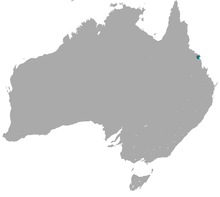Proserpine rock-wallaby
| Proserpine rock-wallaby[1] | |
|---|---|
| Scientific classification | |
| Kingdom: | |
| Phylum: | |
| Class: | |
| Subclass: | |
| Order: | |
| Family: | |
| Genus: | |
| Species: | P. persephone
|
| Binomial name | |
| Petrogale persephone Maynes, 1982
| |

| |
| Proserpine rock-wallaby range | |
The Proserpine rock-wallaby (Petrogale persephone) is a species of rock-wallaby restricted to a small area in Conway National Park, Dryander National Park, Gloucester Island National Park, and around the town of Airlie Beach, all in Whitsunday Shire in Queensland, Australia. It is the only member of its genus to be a threatened species, being classified by the IUCN as endangered.[2]
The Proserpine rock-wallaby is mostly grey in colour and is a timid grass-eater that rarely ventures far from rock shelter.[3] It is distinguished from the many other rock wallabies found in northeastern Queensland by its larger size and longer tail, tipped with white. It was unknown to science until 1977, when a single individual was captured after farmers at Proserpine had spoken of a strange form of rock wallaby in the area.[4]
The Proserpine rock-wallaby is found only in a relatively intensively-settled area, but it is competition with other more successful rock-wallaby species, which competition is probably responsible for its threatened status.[5]
References
- ^ Groves, C. P. (2005). Wilson, D. E.; Reeder, D. M. (eds.). Mammal Species of the World: A Taxonomic and Geographic Reference (3rd ed.). Baltimore: Johns Hopkins University Press. p. 68. ISBN 0-801-88221-4. OCLC 62265494.
- ^ a b Template:IUCN2008 Database entry includes justification for why this species is listed as endangered
- ^ Menkhorst, Peter (2001). A Field Guide to the Mammals of Australia. Oxford University Press. p. 132.
- ^ Karl Shuker, Gerald Durrell (1993). Lost Ark: New and Rediscovered Animals of the Twentieth Century. HarperCollins Publishers. p. 81. ISBN 0-00-219943-2.
- ^ Maynes & Sharman, G.M. & G.B. (1981). Proserpine Rock-wallaby in The Complete Book of Australian Mammals (ed. Ronald Strahan). Oxford University Press. p. 220.

